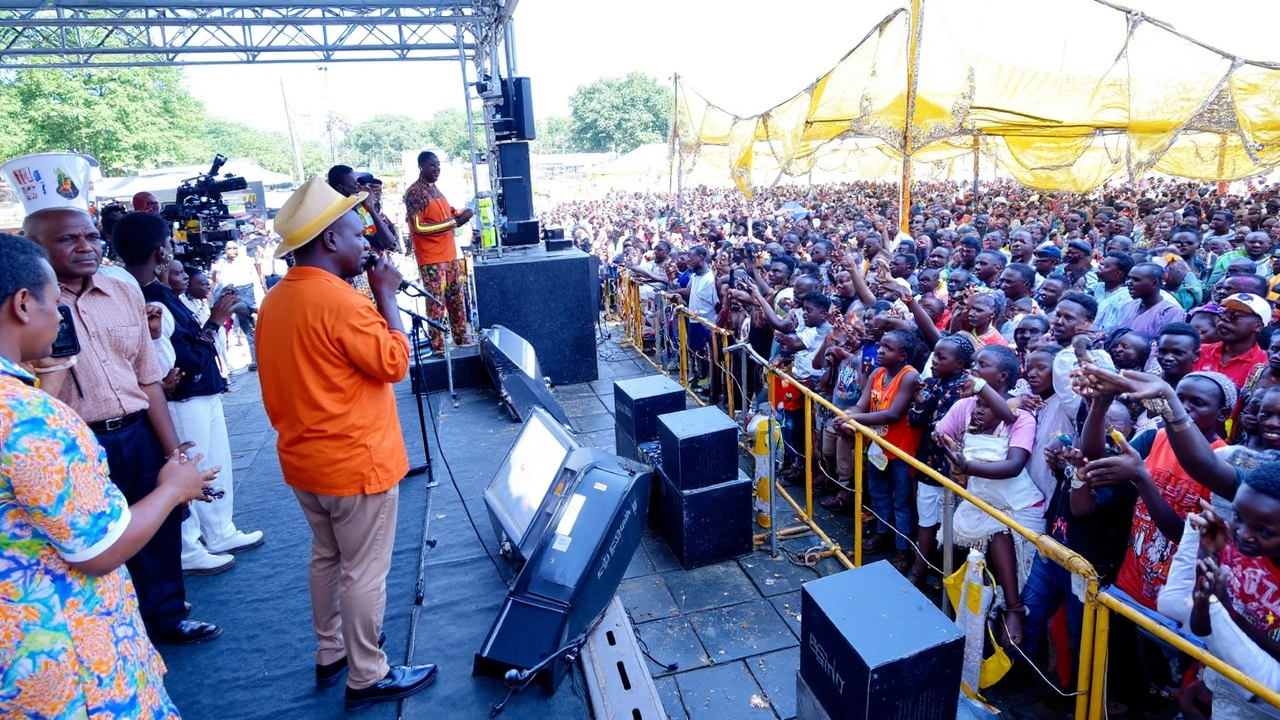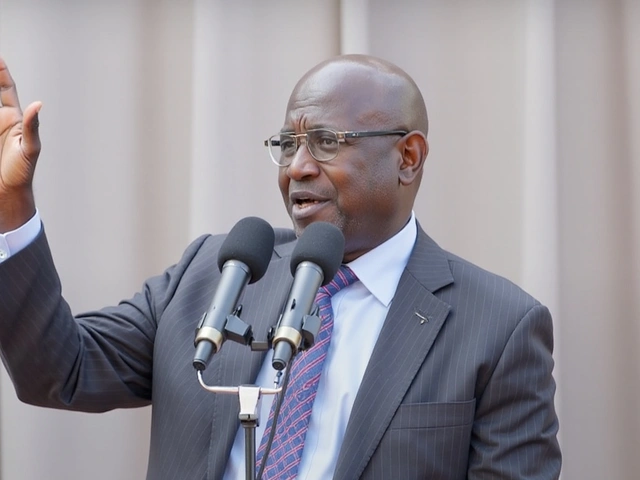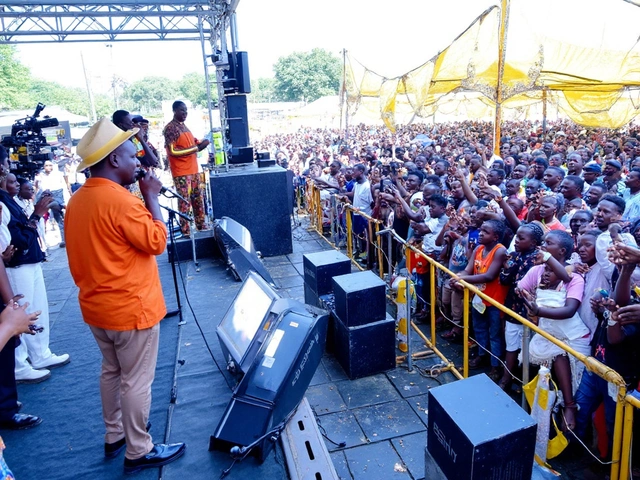Gachagua Steps Away, Political Scene Shifts
Kenyans who follow political drama know how quickly things can change. This month, Deputy President Rigathi Gachagua quietly left for the United States, taking with him the kind of momentum that can keep an opposition movement alive. He didn't just vanish—his departure was a well-publicized mission to reach out to the Kenyan diaspora and global partners. Still, his absence landed hard for the folks back home, who now have a simple but pressing question: Can the opposition stay strong without the man who’s been keeping it together?
Gachagua wasn’t just another political face. Over the past few months, he’d turned into the glue for a sprawling, often unruly opposition coalition. He brought together big names—Martha Karua, Kalonzo Musyoka, Eugene Wamalwa, Justin Muturi, and Fred Matiang’i—anchoring them with clear goals and snappy messages. The now-famous ‘one-term’ chant didn’t just rile up crowds; it gave frustrated voters something they could hold onto, something energetic and clear.
Alliance Under Pressure: Can Kalonzo and Others Fill the Void?
Without Gachagua at the center, everyone’s watching to see how the group holds up. Martin Andati, who spends his days tracking Kenya’s political shifts, points out the obvious: Gachagua wasn’t only a spokesperson; he was the chief strategist. His work in uniting Mt Kenya’s powerful voting bloc and building bridges between rivals gave the opposition more bite than it has had in years.
Responsibility now falls on leaders like Kalonzo Musyoka. Kalonzo’s not shying away from the spotlight—he’s called himself the head of the ‘People’s Loyal Opposition’ and taken charge of legal battles, like the recent push to free detained MP Gitonga Mukunji and journalist James Mbochi. Martha Karua and Fred Matiang’i remain in the ring too, but can they fire up the movement with the same intensity?
The real challenge is less about making speeches and more about keeping this mixed bag of allies focused. The Mt Kenya vote doesn’t just move on its own; it takes real work to keep it pointing in a single direction. And the risk is clear: Without Gachagua calling the shots, the energy he built up around anti-government protests and unity could start to sag.
Inside meetings, coalition leaders are scrambling to show confidence. They argue that their cause isn’t tied to just one person. Even so, a loud section of supporters are worrying—can the movement keep everyone on the same path, or will old arguments splinter the alliance again?
For people on the ground, it’s the small things that matter most—clear plans, strong words, and leaders who seem genuinely connected. Without Gachagua’s rapid-fire rallies and knack for connecting with frustrated Kenyans, the opposition faces a real risk of losing its edge, especially as the government starts pushing its own narrative harder.
The next few weeks will be telling. Will Kalonzo, Karua, and Matiang’i rally support like Gachagua did? Or will the movement’s unity start unraveling, leaving supporters looking for direction all over again?




Comments
Gachagua’s sudden trek across the Atlantic feels like a plot twist ripped from a telenovela, flamboyant yet oddly predictable. The opposition now scrambles like a band of circus performers missing their ringmaster, searching for a new tempo. Still, the fire he ignited might keep the crowd chanting longer than his absence.
The departure of a strategic mind such as Gachagua is not merely a vacancy in the Kenyan political theater; it is a manifestation of the dialectic between presence and absence, a phenomenological void that forces the coalition to confront its own ontology. When the glue that binds disparate factions dissolves, each fragment must either reconstitute its own adhesive or face inevitable disintegration. Kaloko’s self‑appointment as head of the ‘People’s Loyal Opposition’ resembles a philosophical claim that the essence of leadership is merely a label, a semiotic overlay onto an already trembling structure. Meanwhile, the anti‑government chants that once resonated with the vigor of a drum circle now risk becoming a muted echo, a sign that the momentum was perhaps more personified than institutional. The blue‑printed one‑term mantra, once a rallying cry, now serves as a reminder that slogans without a living conduit can quickly become hollow rhetoric. Moreover, the diaspora outreach that Gachagua championed functioned as both a soft power conduit and a feedback mechanism, allowing the opposition to calibrate its messaging against external perceptions. In his absence, that calibrating instrument is lost, leaving the coalition to guess at the resonance of its own narrative. The challenge, therefore, is not simply logistical but epistemic: can the remaining architects reconstruct a shared epistemology that aligns their disparate ambitions? If they fail, the coalition will fracture along the very fault lines that Gachagua once smoothed over with his rhetorical agility. It is a test of whether the opposition’s identity is rooted in a charismatic figure or in a durable ideological foundation, a question that will reverberate through the upcoming weeks and shape Kenya’s democratic trajectory.
Let’s be blunt: the coalition’s current scramble is a textbook case of overreliance on a single brand. Gachagua’s charisma was the adhesive, but adhesive without a substrate quickly loses its tack. Kalonzo may claim the mantle, yet his rhetoric feels like reheated soup-lacking the spice that once ignited the masses. The opposition needs to evolve from personality‑driven to policy‑driven if it hopes to survive this vacuum.
Ah, the drama unfolds! The stage is set, the lights dim, and suddenly the lead actor vanishes, leaving the understudies to stumble in the shadows. Kalonzo steps forward with a flourish, but his prose resembles a legal brief rather than the impassioned oratory that kept crowds roaring. One must wonder whether the coalition will find a new crescendo or dissolve into a quiet murmur of dissent.
From a strategic standpoint, the opposition should prioritize clear communication channels with grassroots supporters, ensuring that the message remains consistent even without Gachagua’s direct involvement. Strengthening local leadership can mitigate the impact of his absence and maintain the coalition’s cohesion. It’s essential to keep the momentum alive through tangible actions rather than rely solely on charismatic speeches.
Unity without Gachagua will be tested.
It’s fascinating how quickly the narrative shifts from admiration of a single figure to a collective identity crisis. While some celebrate Kalonzo’s rise, others whisper that the coalition’s spirit is already fraying. The real question is whether the opposition can reinvent itself beyond the shadow of its former linchpin.
Ah, the irony, the paradox, the endless cascade of political theatre, where one man’s departure becomes the catalyst, the spark, the very fulcrum upon which an entire coalition teeters! Yet, let us not be deceived by the melodrama, for behind the curtain lies a machination of ambition, of power, of strategic repositioning, each player clutching at relevance as the audience holds its breath, waiting for the next act! In this grand spectacle, Kalonzo’s proclamation of leadership reads like a soliloquy, a performance steeped in grandeur and, perhaps, desperation; his words, though spoken with conviction, echo in a hall already reverberating with doubt! The opposition, dear observers, must now decide: shall they rise as a unified chorus or dissolve into a cacophony of competing verses? The answer, as always, will be written not on parchment but in the hearts of the Kenyan people, who will either rally behind the renewed chant or let silence claim the stage!
Well, looks like the opposition’s GPS just lost signal. Kalonzo’s taking the wheel, but without a map, we might just end up circling the same potholes. Time will tell if they can find a new direction or keep spinning in place.
You’ve got to admit, the situation is a litmus test for the coalition’s resilience. If they can rally under Kalonzo with the same fervor, it shows depth beyond a single personality. If not, it exposes a fragile foundation that needs serious restructuring.
It is imperative that the opposition harnesses this juncture as an opportunity for strategic consolidation. By systematically engaging with regional stakeholders, they can reinforce their agenda and demonstrate operational continuity. Such disciplined coordination will signal longevity and resolve to both supporters and adversaries.
The vacuum left by Gachagua is not merely a gap but a crucible in which the coalition’s true character will be forged. Kalonzo’s ascent must be examined not as a mere substitution but as a redefinition of collective purpose. If the opposition can channel this moment into a cohesive vision, it will emerge stronger; if it succumbs to internal squabbles, it will dissolve like mist under the sunrise. The stakes are high, and the outcome will reverberate across Kenya’s political landscape.
Stay hopeful! The coalition can still rally the masses and keep the energy alive 😊. A united front will prove that leadership isn’t just one person but a shared vision.
From an operational perspective, the opposition’s sustainability hinges on its capacity to institutionalize communication pipelines, thereby reducing dependency on charismatic nodes. By leveraging a modular governance framework, they can dynamically reallocate resources and maintain narrative consistency across constituencies. This approach also mitigates the risk of information asymmetry, ensuring that grassroots actors receive real‑time strategic directives. In practice, deploying a decentralized digital coordination platform could synchronize campaign efforts, facilitating rapid response to governmental maneuvers. Ultimately, such systemic fortification will transform the coalition from a personality‑centric assemblage into a resilient, policy‑driven entity capable of enduring leadership transitions.